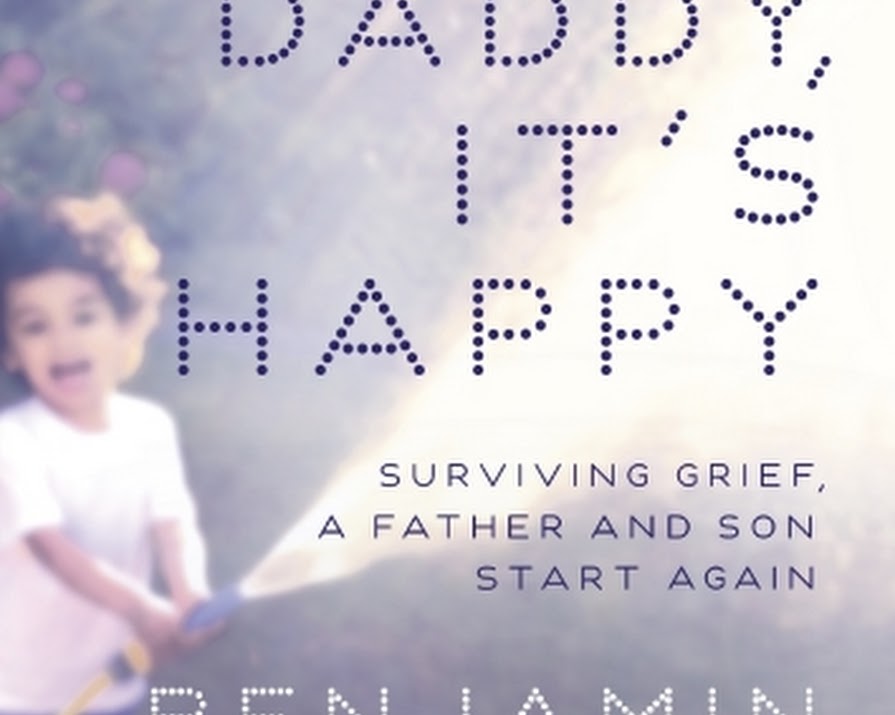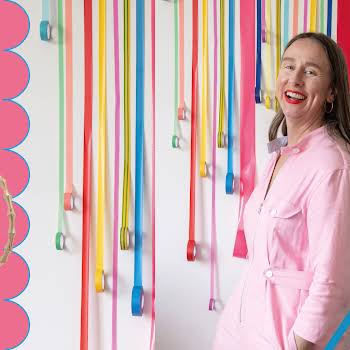
By IMAGE
27th Jul 2014
27th Jul 2014
When Benjamin Brooks-Dutton’s wife was killed in 2012, he faced raising their two-year-old son alone while battling his own grief. In a brave move to raise awareness of the experiences of widowed fathers and their children, he started a blog. As his book hits shelves, he shares just a piece of his story.
On November 10, 2012 my life changed forever. Just after 8pm I left my friends? house a happily married 33-year-old father. By 9.17pm I was sitting in an ambulance on their street, a widower in shock. I only remember the time because I noticed that the hands on the clock were in the same position as when our son was born two years and three weeks before.
My son and I managed to narrowly dodge the car that killed the woman I’d loved for the last eight years. The woman I’d married just the year before. It killed a wife; a daughter; a sister; a friend treasured by so many. But perhaps worst of all, it killed a toddler’s beautiful and devoted mummy.
How do you even begin to pick up the pieces after such a tragic loss? This question plagued me. I found myself wanting to share my experiences and find answers from people just like me, widowed young and caring for grieving children. My search for those people seemed fruitless. It just made me feel even more isolated.
So on January 7, 2013, two months after the death of my wife, Desreen Brooks, I published my first blog post. My original intention was to try to encourage other men to open up, to challenge perceptions of male grief and to attempt to force a reappraisal of the stiff upper lip being a badge of honour when it comes to loss. The blog, however, attracted people from different walks of life united in their own immediate loss, or by their care and concern for grieving loved ones.

I decided I needed to start writing soon after my wife died because of an analogy that one day popped into my head: if women could remember every ache and pain of labour, perhaps none would have more than one child. Human beings? capacity to forget pain is enormous, and in many ways that is a good and necessary thing. Morbid as it may sound, though, it filled me with dread to imagine that I would ever forget the agony of my loss. I was even more worried that I might not be able to explain it to my son when he was old enough to start asking serious questions.
Jackson was at his mother’s funeral but I don’t think he had any idea what was going on. In fact he spent most of it playing outside with a family friend. By this time I’d learned from a child bereavement charity called Winston’s Wish that a 25-month-old child can’t grasp the concept of death. His sense of loss didn’t seem to set in for quite some time. Since Desreen’s death he had been surrounded by friends and family. Gifts, affection and attention all came pouring through our door.
I’m sure that he did notice her absence from one day to the next because he would often squeal with excitement when he heard a key in the door, and yet it wasn’t until after the funeral that he really started to show any noticeable signs of missing his mum.
Our kitchen window overlooked the front door and often Desreen would arrive home from work as I was feeding Jackson his dinner in his high chair. She would never just let herself in without first trying to make him laugh: she’d pull faces; she’d play peekaboo; or she’d walk down imaginary stairs, disappear out of view and then pretend to walk back up. Jackson would howl with laughter and scream with joy until his mummy came in and kissed him all over his face. They were just so in love.
After she was killed, Jackson walked my dad to our front door and pointed at a light shining through the frosted glass. ?It’s Mummy,? he told his granddad. And I suppose we all wanted it to be so – that her spirit had come to visit her son – but really I think that it was business as usual in my son’s little head and he genuinely expected her to come home as night fell.
His apparent lack of heartbreak over the extended absence of his mum crushed me. Our home had been full of people calling her Desreen and not Mummy. So he joined in; within a matter of days he’d gone from calling her Mummy to Desreen too. It was like a dagger through my heart because I thought he was forgetting her.
Then something happened that brought me back to my senses. I put on a DVD, something like Ben & Holly’s Little Kingdom, a show he hadn’t watched in weeks, whatever it was, and he recited all the characters? names. I realised then that he couldn’t have forgotten the person he idolised the most; he was just copying the big people.

Even so, it took about a month for Jackson to actually ask for Mummy in my company. Waiting so long for him to start to question her absence was the single most painful thing I ever felt as a bereaved husband, and the pain was for my wife rather than for myself. I felt as if she was being cheated. As if all the time and love she had invested in him had disappeared in an instant. Sure, he’d stood at the front door and shouted her name when he thought she was coming in from work, but he hadn’t yet asked, Where’s Mummy?
When he finally did, he probably couldn’t have chosen a worse time. I was begging for it to happen. It wasn’t going to make me feel pain; it was going to bring relief. But he did it in front of Desreen’s father, Kelson; brother, Anthony; and one of my two best men, Woody. That evening I learned that the unprepared male doesn’t tend to be too great at this kind of thing.
?Where’s Mummy? Where’s Mummy? Where’s Mummy gone? Where’s Mummy gone? Want Mummy. Want Mummy. Want Muuuuuummmmmmyyyyyy!? he cried over and over again.
He had been storing it up and now he was using it all in one go, and the men present unanimously did that thing where you think if you can tense your shoulders hard enough, you won’t be in the room anymore. A kind of cross between an ostrich with its head in the sand and the nose wiggle from the US comedy Bewitched that made the characters disappear.
The weight lifted off my shoulders and was transferred straight on to theirs. For me it meant that it wouldn’t be long before I could finally tell him the truth about what had happened instead of continuing to put off the inevitable; for them it meant they were sitting in the middle of the one situation that they had dreaded most and didn’t know how to deal with. Who the hell does?
Although he had now started to ask questions, that night would not be the moment he was told he’d never see his mummy again. He was already too distressed.
The right time came soon before Christmas. I’d taken Jackson up north to see my parents and family.

The change of scenery brought out a different side in Jackson. He was more playful and seemed happier than he had been during the past few weeks. I, on the other hand, was sinking into a deeper and deeper abyss. I felt guilty that I had to keep shifting him from one place to another when he must already have been so confused. I felt bad that we had no sense of routine and that I needed to keep leaving him in the care of family to be able to handle all the pressures that had fallen on me since Desreen’s death: work, nursery, media, funeral directors, the police, solicitors, financial advisors, child bereavement advisors, doctors and therapists. I felt wretched; I wasn’t eating well. I was constantly tearful, often snappy and usually unappreciative of the help, love or support that those close to me tried to offer. I was drinking every day; not much, because I couldn’t really stomach it, but enough to leave me with too little energy to be fun company for a little boy. As if I could have been fun anyway.
The night after we arrived, I took Jackson to bed while he was happy and calm. I lay with him, read him a story and told him how much I loved him. He cuddled up to me softly. I realised that the time was right to start trying to explain what I knew was going to take some time to sink in.
As soon as my son had started asking where she had gone, I made a decision about how to handle it. I decided to tell him the truth. Somehow the illustrated books I’d been given by well-meaning friends, which explained to a badger that his elderly rabbit friend had gone to the stars, were not going to help my child understand why his mother would never be back.
So that night, the week before Christmas, I showed him a picture of Desreen on my phone and invited him to kiss it. ?Jackson,? I began, ?Mummy’s gone away and she can’t ever come back.?
Our vicar’s wife had given me some literature that she had dug out about child bereavement, something she had studied as part of a master’s degree years before. This had pointed me in the right direction of charities including Winston’s Wish, Grief Encounter and Child Bereavement UK, who explained that Jackson was too young to understand the meaning of dead or killed. In fact, I’d learned that children don’t even know what ever or never are until they are around five or six. But still, I felt that a consistent narrative would be important to maintain over the years.
?She didn’t want to go,? I continued. ?She would never have left you out of choice because she loved you more than anyone or anything in the world. But Daddy’s still here and I’m going to look after you now. And I know how to look after you because Mummy taught me.?
We lay together until he drifted off. Once he was asleep I gently peeled him off my chest, tucked him into bed and went back downstairs to tell my mum what I’d told my son. I asked her and everyone who cared for him to use exactly the same words as I had, to try to minimise his confusion. I banned expressions such gone to a better place because I worried that he might want to go there too or, perhaps worse, think she’d chosen that mysterious place over him. And I chose not to talk about heaven because, at that time, he didn’t know the geographical difference between paradise and the local park.

The maddening thing about bereaved toddlers, or rather, any toddlers, is that you can tell them something one day but they may well have forgotten the next. Even if they say they understand, you can often find ways to prove that actually they don’t.
Jackson used to do this thing that I loved. When I took him to bed and he snuggled up to my chest, I could ask him anything and he would agree with a silent nod. At two years old this was the only time when he was actually quiet because he would talk, sing and giggle all day long and often even in his sleep. It was also the only time he wasn’t contrary, because he was going through the phase of saying ?No!? and ?Not!? to almost everything anyone said.
?Jackson, do you want some milk?? Silent nod. ?Jackson, do you want a dummy?? Silent nod. ?Jackson, could you do a better job at fixing the economy than the current coalition government?? Silent nod. No end of fun for me. Fun aside, however, it meant that when I asked him if he understood what had happened to Mummy at the one time of day when we really got to talk as man and boy, undisturbed, he would simply silent nod. I would go to sleep more or less peacefully, thinking that he had started to take it in, but the next day I really couldn’t be sure if he was going to ask where she’d gone, again and again.?The fascinating thing, though, is that he never really asked ?Where’s Mummy?? after that night. The question quickly turned to the statement ?Want Mummy.? His question had been answered and he proved to me that he had absorbed the information when Caroline’s three-year-old child asked the same question just four months later. ?Where’s Jackson’s mummy?? ?Caroline and I froze and gawped at one another as her son, Arlo, asked the question that we’d all come to dread. But Jackson, a child 31 years our junior, casually looked up and replied, ?She’s gone away in the sky, far away. She can’t come back.? Then he continued to play with his trains before moving on to a spot of colouring with crayons and inks.
Although I felt sad that he had to explain why his mum was no longer with us, I was also so proud of everyone who’d had a role in delivering a consistent message to him. Sure, heaven came into the equation for some people, ?the sky? slipped in when it wasn’t quite the message I’d originally briefed, but the important thing was that my son, who was not yet even two-and-a-half, could answer for himself. He didn’t follow a question with another question. Although my heart broke for both of us in that moment, I just couldn’t imagine how much worse it would have been for him if he were still asking all the questions about his mum himself.
But questions weren’t the only thing that hurt; sometimes Daddy just wasn’t enough. When Jackson fell over he would call ?Mummy!? Whenever he felt sad he did the same. It’s beyond painful to hear your child cry for something, for someone, you cannot provide. Yet over time the mentions of her name would become a great comfort to me. Yes, Jackson would be distressed when he called for my wife and perhaps it sounds strange that I could draw any solace from his suffering. But to me it meant she was still there in his head or his heart; that his reflexes immediately responded with a desire to be with Desreen.
I was told by someone who worked at the bereavement charity Winston’s Wish, ?He might forget the memories but he’ll never forget the love.? What a wonderful thought to hang on to when a child loses a parent too soon.
Extracted from It’s Not Raining, Daddy, It’s Happy: Surviving Grief, a Father and Son Start Again, out now.
lifeasawidower.com @lifeasawidower























